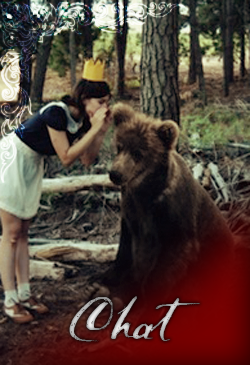ELISE MONET
LEGENDS
ADULT
THE GRIM REAPER
DORMANT
Posts: 4
|
Post by ELISE MONET on Aug 25, 2012 12:08:33 GMT -5
Sometimes she thinks about what it must be like—the breathing, the breath, the wondering, the waiting the knowing in the back of the head that one day it must be coming, someday hopefully not so soon. She only sees the aftermath and the before, never the during. The during is the complete lonesomeness, the bit of her she can feel but never touch and smell but never taste and hear but God, she will never see if for all her years or days or hours or seconds and she hasn’t before, not even once. And they all do. Alive is a beautiful thing, she thinks, and then so is dead but maybe not the little bit in between, the little wavering line of here and now and there and later that not even she can bold or straighten to make more clear.
It’s the water, she thinks, that helps. No one knows for sure and especially not she but she likes it here, in the breeze and the not quite silence and the sound and the feel and the smell of living and oh sometimes she wishes she could join them and fit somewhere that wasn’t so tucked-away-in-the-corner inbetween. People like to forget about her and pretend she isn’t there because she’s the one person who ought to be, really, even if she doesn’t quite belong with more than one foot and the right side of her limbs.
No one knows her name.
She is too long and too old and too sore for that, she thinks, and so she lets them call her what they will and maybe someday someone will figure it out, but they won’t be able to say it because it’s a language long gone and shriveled and tucked away in a book no one knew how to write or speak or say because such things as names weren’t meant for words, anyhow.
And in time, she thinks, maybe someone will remember.
And wouldn’t that be beautiful?
Almost like the sun dipping through the trees or the grass bending in the breeze she slips her hand beneath the water, cold and crisp as an ice cube’s daughter, and grabs a pebble from beneath the surface, not so deep here and there are other rocks, but the ones from beneath are by far the best. It’s small, smooth and round and she thinks it feels like Earth, maybe, on the days where she cradles it in the palms of her hands and listens to them cry and curse her and she weeps for them, with them. She weeps with them quite a lot, even for the stories.
Elise hums to herself, the sort of sad unbending tune that only the self can create and she works the stone in her hand under the water and peels the moldy moss from its back with her fingers—dirt doesn’t bother her and it never has. She likes the feel of it, old and new slick and not quite wanted. And she dips her toes into the pond and lets her dress curl up on her legs and she watches the water and the ripples and she makes some more, very slowly, and she wonders why on earth anyone would not want to spend their day somewhere as beautiful as this little duck pond with its sandy rocks and crisp cold water and hidden wind and complete and utter lack of ducks.
And she knows that more people would want to spend their day here, maybe, if only she were somewhere else.
|
|
|
|
Post by ISMAEL MULHOLLAND on Aug 25, 2012 19:35:18 GMT -5
Funny the way time works, funny that he had been walking the streets of Victorian London with the clamor of news on all tongues around him, can you believe Prince Albert is dead?, and now he is here, so many years away and yet somehow nostalgic for a world that has never been his, a time and a place into which he has never been born. He feels so sad, now. Sometimes he thinks it would be nice if he could be with the Queen for those too-long days after Albert's departure, braid her hair and tell her "So it goes" and tell her that somewhere in another time he is still alive so there is no need to cry or be sad because even if she can't see him anymore he is alive and well somewhere else.
She probably would have had him exiled for that. The thought makes him smile. Exile is such a funny word, so very hard, like thick glass. Exile. A funny word, too, so inapplicable to him; he is exiled from everywhere, permanently, anciently and enduringly separate from the rest of existence, exiled from the world of the temporally fixed, permanent and impermanent, like an irremovable stain on a shirt that doesn't quite bleed through to the other side.
How lonely it is to be the only stain on his side of the shirt.
Regardless, he likes moments like this, these moments of silence and in-between when he isn't really anywhere, isn't really doing anything. Of course, what is he ever really doing? Wandering? Not a very profitable job, nor a very demanding one.
But money has little relevance to him.
He closes his eyes and lets the soft wisp-fingers of the grass enfold him, lets them come up between his loosely-folded hands as he rests his chin in the triangular crook of an arm. He likes to lie down, different ways for different reasons; on his back when he wants to fill his eyes with sky, fill his chest with sky, fill his everything with sky -- on his stomach when he wants to be on the ground. He is on his stomach now, watching the glassy perfection of the duckless duck pond, and out of the corner of his green eye he can see the faint stirrings of the birds from eighty-six years ago when a small family of mallards lived along the bank amidst the cat-tails. He watches in his peripheral as a family from eighty-six years ago rounds the edges of the grounded piece of sky, the littlest one a girl of six in a bonnet. She giggles as she throws bread to the ducks. He smiles.
He likes the feel of this place, the picnicfamily duckpotential, the serenity of the hydrogen bonds as they hold up the feet of the water-striders. So gracious, he thinks. Could just let them down. Ah, the perplexities of science.
He is vaguely aware of the girl on the rock sitting relatively close to him, ten or twelve feet away, aware of the oldness that hangs around her like a shroud. It reminds him a bit of his oldness. He likes it. But there is something new about her oldness, like a restored painting.
Curiosity overcomes him, and he turns his eyes to her intently.
|
|
ELISE MONET
LEGENDS
ADULT
THE GRIM REAPER
DORMANT
Posts: 4
|
Post by ELISE MONET on Aug 26, 2012 21:46:18 GMT -5
She can feel him. Like a last thought or a final breath, his presence winds around her with the breeze, the old worn smell of him tickling her nose like grass, or how she supposes grass might tickle if she were to stick some up there just barely. And then maybe that still wouldn’t be quite right. He’s familiar. In much the same way as sunlight and the feel of the petals of memorial wreaths that she plays through her fingers when she wanders in the cemeteries and asks the dead do they like it, living forever amongst only their own stories? It isn’t cruel. Just curiosity. She’s always wondered what it’d be like to live forever in a story instead of floating in and out of others—she doesn’t quite belong and then neither does he, this not-stranger with his book-worn scent and summer breeze silence that smells like something else, something from a place she might have been before long ago or maybe just read about once and imagined, but it’s all the same thing, really. Pretending and floating and drifting and holding and crying and guiding.
She is silent though, pretending he isn’t there or perhaps waiting, feeling him out with her soul perhaps, exposed just peeking out from behind the wisps of hair not quite pulled over her shoulder, in the space between the fabric of her dress and the skin which is smooth and soft and kind and new and not at all like the thing peeking out from it which is old, older than anything except maybe this boy-who-isn’t-quite-there, who she can feel watching and who she doesn’t look at but can he see it, maybe? the bit of her peeking out beneath the shirt collar, behind the long curled curtain of hair she tucks slowly behind her ears as she hums? Maybe. And then, maybe not. People surprise her and so does the wind.
The rock turns in her hand a moment longer before she lifts it, cradles it from out of the water and into both her hands, wrapped around her knees, and she watches the leftovers dripdrop down to the pond and stick there, just over the ripples of her toes. She blows on the stone, a gentle whisperbreath, and the rock does nothing because it is not alive nor dying nor anything in between but she smiles anyway because maybe that was the point, not to change a single thing.
And she licks her lip, just the bottom, and the bites it a bit and she sets the stone on the rock beside her and goes back to drawing patterns in the water and thinking she knows him, this boy-who-is-not, and she knows the feel of his eyes though maybe not these, and the smell of him though maybe not this him, and she thinks that maybe it ought to be odd that she thinks that, as this boy is neither a neighbor or a grocery man and she has never seen him before—but she has felt him, certainly, in the hideaway corners of her house and beyond.
So she speaks. She doesn’t look up and her voice is soft but she knows he will hear her because they always do, people, when they feel each other before seeing or speaking. “You’ve been belonging somewhere else…” she says almost absently, not bothering with hellos or how-you-do’s or thank-you-kindly’s because they’re always ever so fake, after all, and the obvious is far more interesting.
|
|
|
|
Post by ISMAEL MULHOLLAND on Sept 22, 2012 22:13:47 GMT -5
He can feel her, a part of her, at least, the old part that is ancient and forever and achingly familiar to him. It takes him a heartbeat to identify her. Old friend. Partner. They have worked together, side by side, for such a long time, and he is so often blamed for her passings-through. He has nothing to do with her, though, not really. If she did not take the living from life, he would continue to pass. He is unchangeable and constant. Whether or not Death does her work has no effect on his mission.
But still, they have crossed paths so very often that he always has some sense of her, in the same way that he has some sense of Life, feels every new baby born, every poor soul saved by valiant white-coated surgeons in an emergency room somewhere close and far away. Such forces are in accordance with him. He has harmonized them to his song, stepped between and around and next to them for almost as long as he has been. Not this him, of course. Just the rest. The old parts.
But they are correlative, they are not interdependent. He is a passive arbiter, creating nothing, destroying nothing, simply being. They have their respective jobs to do.
He has always found something more peaceful about Death, though. Something more permanent, more serene. He enjoys it, her quiet grace, her resolve. It is beautiful. It has always been beautiful.
He reaches out a bit of himself across the water from an extended fingertip, a faint stirring of his age between the particles of the air. She will sense him, he is sure. She has already, he thinks -- scented him, in her way, as he has scented her. But he does not speak first. He rarely speaks first because it is not his place to interrupt the silence he brings in his wake. He is the eternal response and the eternal unanswered question, and so he does not speak first, because he does not have to.
Silence is neither unfamiliar nor unpleasant to him.
But she speaks first, before he has the chance to begin to wonder on whether she will, and her voice is so high and soft and musical, a voice he has never heard and a voice he has heard a million or more times before. His bottom harmony.
"Yes," he answers. His eyes trail to her, mismatched shades of green settling on the gentle blondness of her new hair. "It's been too long, my friend..." His lips curl into a kind and nostalgic smile. "You were different when I saw you last."
|
|










